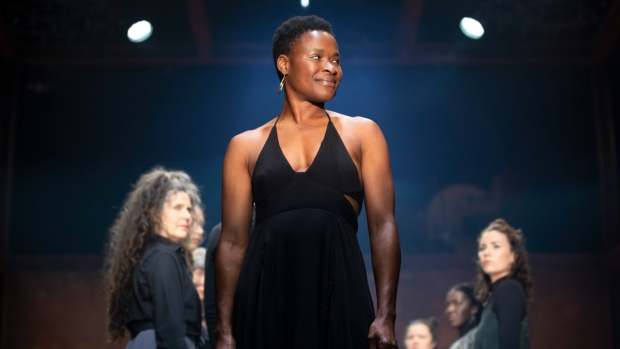National Theatre of Scotland’s ”Medea” – Edinburgh International Festival review

© J Shurte
There’s something pleasingly ritualistic (and, therefore, very Greek) about Michael Boyd’s new production of Medea for the Edinburgh Festival and the National Theatre of Scotland. Tom Piper’s designs, an ochre hue and rust-stained thrust stage, drive the action into the very heart of the audience, who stand around observing. The music is stripped down to the primal thrashing of a percussion ensemble, and Medea’s opening cry, delivered offstage, is so raw and brutal as to curdle the blood.
As well it should. This is one of the darkest of all the Greek tragedies. Euripides’ take on Medea traces the myth of the sorceress who helped Jason to win the golden fleece but then, when Jason abandons her, wreaks a terrible revenge by murdering Jason’s wife, father-in-law and, worst of all, their children. It’s a story that taps into some of our deepest fears and unspoken terrors, and Liz Lochhead’s version, now twenty years old, seeks, like all good contemporary productions of Greek theatre, to trace how its universality can speak to us today.
Lochhead removes the divine elements completely. There is no deus ex machina at the end, and any witchcraft or enchantment happens offstage or before the story begins. Instead, this is a tale of mankind alone in a malevolent universe; or maybe I should say womankind. The chorus of ten, all female in this production, seem to speak on behalf of all women who are misused at the hands of men, and who are torn between the twin urges of maternal love and implacable revenge. Medea is the driving engine of the play, contrasted not only with the revolting Jason but with the inert Nurse and the ditzy Glauke, Jason’s new bride. The screw tightens as we watch, Medea confiding to both the chorus and the audience her plans for revenge, and once that happens the inevitability of the horror seems inescapable, every way out gradually cut off.
The production is built around the electrifying Medea of Adura Onashile. She’s incredible to watch, a performance that draws the eye with her quiet physicality, and a voice that commands the attention with every word she speaks. From that fearful opening cry to the chilling resolution of her final vengeance, she gives a performance that’s little short of breathtaking. Against her, Robert Jack’s sexually charged Jason effectively treads the line between goading his former lover and hiding the fact that he hasn’t quite moved on from her, regardless of what he says. All of the minor roles are equally well-observed, from Alana Jackson’s lightweight Glauke and Stephen McCole’s booming Kreon, to the haunted Nurse of Anne Lacey and Adam Robertson’s servant, whose spittle-flecked speech portrays the grisly scene at Jason’s wedding feast.
My only problem was with Lochhead’s choice of language. It’s broadly in Scots, which works well enough in some ways but, in some scenes, deflates the grandeur of the drama. Nor is it entirely consistent. Often the Scots characters speak in deliberately earthy language, presumably to bring it closer to the world of the audience: Jason, for example, talks about being in “deep shit”, and tells Medea to “wheesht yourself.” Elsewhere, however, the Scots is put aside for grandiloquent English spoken in a Scottish accent, such as the Nurse’s deeply poetic address to the fate of the Argus, or Jason’s own invocations to Medea’s fate. If it isn’t used to a particular purpose, then why use Scots in the play at all?
The one outstanding use of it is in Medea herself, the only character who doesn’t speak it at all. It’s another thing that sets Onashile’s performance apart: she’s the only foreign character in Corinth, and she’s also the only non-Caucasian principal actor; therefore she’s an outside several times over, and that gives her character both a rationale for her actions and a compelling watchability. For her performance alone, this is worth seeing.












